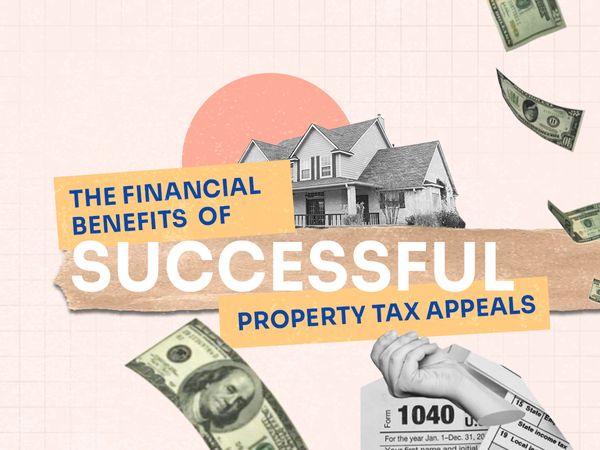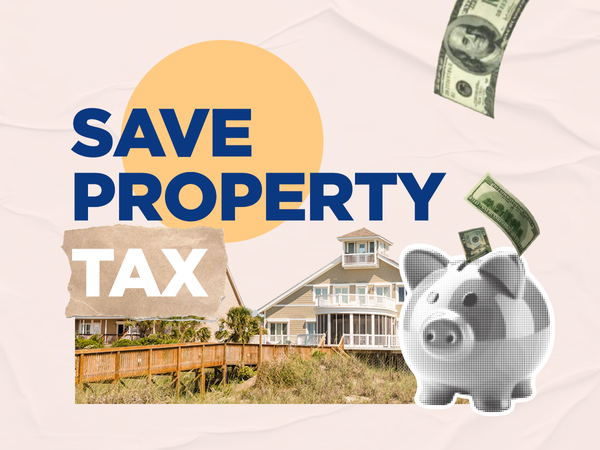-
According to state Senator Paul Bettencourt from Houston, the bill would save the average homeowner around 41.5% on property taxes per year, which amounts to roughly $1,300 annually.
The plan aims to allocate $12 billion to lower property tax rates for homeowners and businesses, along with increasing the homestead exemption. Additionally, a pilot program is proposed to reduce taxes on specific residential and commercial properties. We anticipate the legislation to be approved later this week.
Finally, after months of back and forth among Texas' top Republicans, state GOP lawmakers managed to reach an agreement on Monday regarding the reduction of property taxes for Texans.
The Texas House and Senate recently reached a $18 billion compromise, aiming to provide property tax relief for homeowners and establish temporary caps on appraisal increases for certain non-homesteaded properties. This move is set to benefit around 5.7 million homeowners across the state.
It will also decrease franchise taxes for small businesses and allocate billions of dollars to school districts, enabling them to reduce taxes for everyone. However, the legislation filed by state budget leaders on Monday specifies that none of that money will be allocated for additional public education funding.
The proposal needs to go through both chambers first before it goes to Gov. Greg Abbott's desk. Abbott mentioned he's excited about approving it. After that, we'll have a constitutional election in November to see if voters pass the plan. If the deal gets approval from voters, the tax cuts will kick off in the 2023 tax year.
“I promised during my campaign that the state would return to property taxpayers at least half of the largest budget surplus we have ever had,” Abbott said in a statement after Monday’s announcement. “Today’s agreement between the House and the Senate is a step toward delivering on that promise. I look forward to this legislation reaching my desk, so I can sign into law the largest property tax cut in Texas history.”
Last week Lt. Gov. Dan Patrick and Texas House Speaker Dade Phelan, along with members from both chambers, had negotiations. Dan Patrick went on to say of the meetings “made a difference.”
“It has been a long road, but this is a great day for all property owners,” Patrick said. “It may have taken overtime, but the process has produced a great bill for homeowners and businesses.”
The new legislation, which is likely to pass this week, sets aside around $12.6 billion to decrease the school property tax rate by 10.7 cents per $100 valuation for both homeowners and businesses. On top of that, it also increases the state's homestead exemption from $40,000 to $100,000, costing an estimated $5.3 billion. Plus, seniors and property owners with disabilities can expect a little extra relief, averaging an additional $170 per year.
According to state Senator Paul Bettencourt from Houston, the bill would save the average homeowner around 41.5% on property taxes per year, which amounts to roughly $1,300 annually.
“Taxpayers WIN! All residential and commercial real property WIN! 5.72 million homesteaders WIN!” Bettencourt said in a written statement.
Here's another part of the plan: it's kinda like bringing back a contentious idea the House already suggested. It's gonna put a cap on appraisal increases for commercial and non-homesteaded properties valued at $5 million or less, for three years - like a 20% limit. Oh, and the comptroller might adjust that number each year for inflation.
On Monday, leaders called that section of the bill a "circuit breaker" program, but it's a bit of a misnomer. Unlike similar programs elsewhere, the Texas proposal doesn't take into account a person's income or ability to pay property taxes, nor does it specifically aim to help lower-income taxpayers.
Phelan expressed his satisfaction with the agreement, highlighting the positive impacts it will have on Texans. “Reducing property taxes, providing relief to small-business owners, and reforming our appraisal system will ensure economic growth and prosperity, and this agreement is a significant victory for all Texans,” Phelan said in a statement.
On Monday, we filed the new property tax relief bill, a franchise tax relief bill, and the constitutional amendment needed to enact the cuts.
After nearly seven months of arguments among the state's top Republicans, the deal finally brings an end to the stalemate over how to distribute the $12.3 billion in new tax breaks that lawmakers budgeted earlier this year.
This year, the Republicans arrived in Austin with an impressive surplus of around $33 billion. They made big promises to deliver tax relief to Texas property owners, who endure some of the highest property taxes in the nation. However, for the majority of the year, the House and Senate leaders, Phelan and Patrick, couldn't agree on the best approach to achieve this.
Here's the deal: the big debate was whether those who own homes or businesses should get a larger tax break. Phelan and the folks in the House were all about sending that fresh $12.3 billion to school districts to lower their tax rates - they called it "tax rate compression." That means everyone's property tax would go down, but the ones who would really reap the rewards are the business owners.
Abbott and the conservative tax-cut warriors saw the proposal as a way to speed up the process of eventually getting rid of the school maintenance and operations tax. This tax, which makes up the bulk of the school property tax, covers day-to-day school expenses such as teacher salaries. However, as time went on, Abbott's support for a compression-only tax-cut proposal seemed to fade. He urged House and Senate leaders to reach an agreement and send him a bill.
Patrick and the tax-cut writers in the Senate reached an agreement with the House to allocate $12.3 billion for property tax cuts. However, they planned to use only 70% of that amount for tax rate compression. The remaining funds would be used to enhance the state's school district homestead exemption, which protects a portion of a home's value from being taxed for public schools. Patrick and Bettencourt, Patrick's lieutenant on the tax-cut issue, advocated for increasing the exemption from $40,000 to $100,000.
Temporary Appraisal Cap Proposal
The House had a previous proposal that aimed to limit how much taxable property values can increase each year, referred to as an appraisal cap. However, this proposal didn't make it to the final deal.
In Texas right now, home valuations are only allowed to rise by a maximum of 10% per year. But that rule only applies to homeowners, not businesses or other properties. The proposal from the House was to make that limit even smaller, at 5%, and extend it to cover all properties. This idea got a lot of backlash from tax-policy advocates, no matter their political leaning.
The new plan introduced on Monday suggests a pilot program to set limits on appraisals for non-homesteaded properties with lower values. This program would be a completely fresh addition to the tax code, but let's be clear, it's not your typical circuit-breaker program, despite what the leaders are saying.
Circuit breaker programs got their name because they function like electrical circuit breakers, stopping property taxes from causing financial harm to taxpayers. These programs offer specific assistance to residents in certain situations, such as seniors or renters, when their tax burdens become excessive. Each state administers these programs differently, with some incorporating them into income or property tax systems, while others provide rebates. This analysis comes from Every Texan, a progressive think tank based in Austin.
In Texas, for a successful income-based program, it would probably make sense to have a rebate-style system. Since Texas doesn't have a statewide property tax or income tax, this approach would facilitate income verification and simplify program administration, as noted by the analysis from Every Texan. Back in the 1990s, a similar program in Texas failed due to the significant administrative expenses that arose from the lack of an income tax, as reported by Every Texan.
Monday's deal seems to avoid those complications by focusing on lower-valued property instead of taxpayer income. However, advocates for lower-income residents are concerned that renters and lower-income property owners may not benefit from this approach.
The Texas program will expire on December 31, 2026, unless lawmakers choose to renew it or make it a permanent later on.
The previous proposals from both chambers didn't include any specific tax relief for the state's 3.7 million renter households. Last week, House Democrats presented their own tax-cut plan, which would provide tenants with a cash refund of up to 10% of their previous year's rent. However, Republicans didn't include anything similar in the package released on Monday.
Some Republicans and tax policy experts claim that renters will benefit from the tax-cut package's compression component. They argue that landlords will pass on fewer property taxes to their tenants, leading to smaller rent increases. However, others argue that rent increases in recent years are mainly driven by the high demand and lack of supply in the state's rental market, rather than property taxes.
Last year's real estate market was exceptional, but most properties will likely not be affected by this provision. Even if taxes on rental properties are constrained by the proposed cap, there's no guarantee that landlords will pass on the savings to their renters. That's just the reality of the situation, as explained by Dick Lavine, a tax policy expert at Every Texan.
However, previous House plans have faced criticism for favoring wealthy homeowners and businesses over lower-income Texans. The introduction of the temporary new cap seems to be the most unique addition to Monday's deal.
And it's basically the best the House can hope for in the deal, where they get the whole homestead exemption the Senate wanted, but only 60% of the compression that the House and Abbott were pushing for in the first special legislative session of the year.
Considering the pushback on previous proposals to limit appraisals, it's surprising to see this concession made during the early stages of negotiations.
Throughout this year, Phelan and state Rep. Morgan Meyer, a Dallas Republican and the House's main tax-cut writer, worked hard to strengthen the state's appraisal cap for homeowners and expand the advantage to business owners. This effort was a response to the concerns expressed by residential and commercial property owners who experienced significant increases in their property values due to the state's thriving housing market and booming economy.
Experts in housing and tax policy cautioned that this proposal would have numerous negative consequences without actually reducing tax bills. It was immediately dismissed by Patrick and the Senate Republicans.
Want to pay your fair share of property taxes? Let Bezit help you save money! Our property tax specialists will analyze your home's fair value, present your evidence, and coordinate all necessary documentation and filings for you. We can help you potentially save thousands of dollars. Contact us today to start saving! Go to Bezit.co




